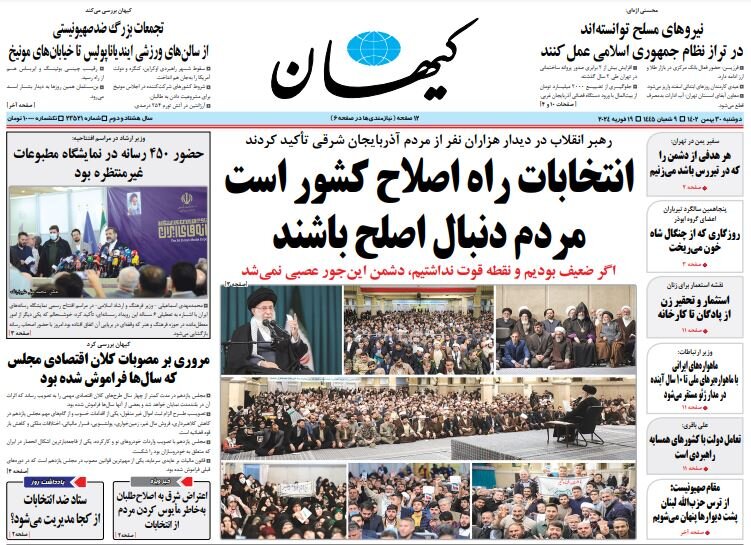Iran has emerged as a superpower vis-a-vis America and Israel

TEHRAN - In a note, Kayhan addressed Iran's position in the region and wrote: The events of the last few months in the region indicate a much more important event: the emergence of Iran as a Middle East superpower.
According to the Singaporean Straits Times newspaper, Iran's missile attacks on Syria, Iraq and Pakistan are a sign of Iran's power as a regional hegemon. In late 2023, the Pentagon accused Iran of a drone attack on an oil tanker in the Indian Ocean. Each of these attacks had its immediate justifications. But all these operations, which took place in a short period and a wide geographical radius, indicate a much more important event: the emergence of Iran as a Middle East superpower, which is no longer content with using only proxy militias. Iran is ready to use its armed forces to achieve its strategic goals. From the point of view of the West, this is a worrying development and the beginning of a new and even dangerous period in the Middle East.
Siasat-e-Rooz: Repeating a mistake
Siasat-e-Rooz referred to the Munich Security Conference and wrote: This meeting was held while the founders of this meeting claimed to act for the security of the world. The trend of developments shows the opposite of this claim. Iran was not in this meeting as the first country to fight terrorism. Not paying attention to Iran's experiences and views in the fight against terrorism shows the West's lack of motivation to realize security in the world. This approach becomes more obvious when the West continues to insist on the old policy of sanctions against Iran. Also, the issue of the Gaza war has been raised in Munich, where, first of all, no action has been taken to hold accountable and punish the Zionist regime as the perpetrator of the genocide and the continuation of the war, and the Westerners have even emphasized the political and military support of this regime and the accountability of the Gaza resistance. Secondly, in this meeting, the leaders of the resistance, who are the main axis of Gaza, were not invited, which is also contrary to the principle of pacifism.
Iran: Another false claim
Reuters has claimed that the demand of the IRGC Quds Force commander to the Iraqi resistance has led to the stop of these groups' attacks on U.S. military bases in the region. The claim of this Western news agency has been made while following the Iraqi resistance attack on an American military base, this country threatened to retaliate and claimed that the Islamic Republic supports these groups. The Iraqi resistance group immediately announced in a statement that it would act independently and without Iran's support and stop its attacks on American bases in order to prevent the spread of tension in the region. This is while our country, despite pursuing its strategic goals in supporting the resistance, has not intervened in the attacks of the resistance groups, especially in the recent war in Gaza. These groups have carried out retaliatory measures against the massacre of the American-Israeli axis in the occupied territories at their discretion. For this reason, the publication of this type of news by a media outlet such as Reuters, which has a history of falsifying news about Iran, can be evaluated in the framework of the imaginary requests of the American authorities to Iran to prevent the reactions of the resistance front against Israel.
Shargh: Iran supports but not provoke!
In a commentary, Shargh addressed the Washington Post's claim about Iran's private negotiations with Lebanon's Hezbollah and Shiite groups in Iraq and said: The Washington Post newspaper claimed in an exclusive report and quoted Western and Arab sources that Iran during private negotiations with Lebanon's Hezbollah and Shiite groups in Iraq and Syria wanted them to exercise restraint and not to face off American forces. It is written in this newspaper that Israel's brutal war against Hamas in Gaza has provoked conflict between the United States and Iranian proxies on several fronts. Without a ceasefire, Iran could face the most significant test that has been done so far regarding its ability to influence these allied militias. When U.S. forces launched attacks against Iran-backed groups in Yemen, Syria, and Iraq in February, Tehran publicly warned it was ready to respond to any threat. But according to Lebanese and Iraqi officials who were involved in the talks, Tehran calls for caution. Despite the independence of the resistance axis in their attacks, Iran has always emphasized that it is always a spiritual supporter of the resistance axis and its effort is to reduce tension in the region.
Leave a Comment